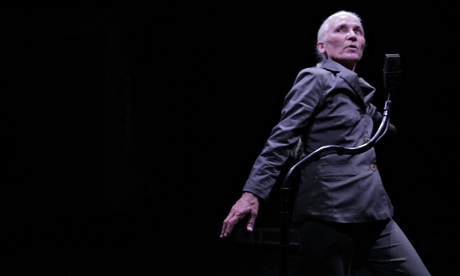
She leans down to unlace her shoes, a tiny figure in a grey suit, her long hair tied back. And then she wades in – deep into the river of James Joyce's Finnegans Wake, pulling us in with her. His last novel, even for those who believe it a work of genius, is famously difficult. The critic Edmund Wilson, a contemporary admirer, talked about it as a palimpsest: "Joyce with his characteristic disregard for the reader, apparently works over and over his pages, packing in allusions and puns." Hearing it spoken aloud – adapted, performed and directed by Olwen Fouéré – is the best of all possible immersions – and/or introductions.
Fouéré speaks fluent Finnegan, with rollicking alliterations, submerged Irish malapropisms and Jabberwocky excesses. And one has a keen, intermittent pleasure in its coinages (salvocean a favourite). Throughout, one marvels at Fouéré's feat in memorising the text. She focuses on Anna Livia Plurabelle, the mother who doubles as the river Liffey, and the test of listening is about surrendering to an ebb and flow. Joycean jocularity is never far from sadness, the sense of something wrecked – the Fall. Trying to make sense of what you hear, it occurred to me, is like removing verdigris by degrees from copper: the understanding shines through in patches. And I noticed then the word I'd written down: verdegree – Joycean language is catching.
The evening's odd power is in the contrast between Fouéré's clarity and the text's obscurity. She is an evangelical interpreter: she convinces not only that she understands minutely but that with her dancer's intensity, swimmer's arms and a face as determined as a propaganda poster, she will enlighten us too. It is an extraordinary tour de force until, after an hour, it abruptly ends because – as Joyce himself put it – "Every talk has his stay."

